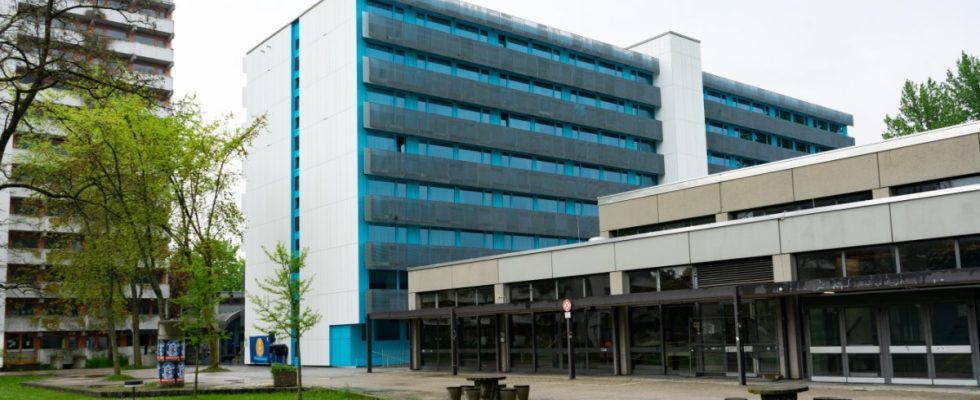After years of regression and standstill, things should finally move forward in the student town of Freimann. On Tuesday not only a freshly renovated dormitory with 250 places was opened, which is now named after the resistance fighter Sophie Scholl. It is now also certain that the two largest vacant houses with more than 1000 apartments will go from the Studierendenwerk to Bayernheim. The state-owned company is to rehabilitate them for a total of around 150 million euros. House 12 (440 places) should be completely renovated by 2027, house 9 (616 places) by 2028.
After Bayernheim had been examining the takeover since September, Bavaria’s Construction Minister Christian Bernreiter and Science Minister Markus Blume (both CSU) announced the renovation when the house reopened on Tuesday. Only “a few details” would have to be coordinated, according to Bernreiter. The money comes mainly from the two ministries and from Bayernheim’s equity. “We’ll turn the redevelopment city into a real student city again,” promised Bernreiter.
While both ministers praised themselves and each other for their cooperation, and Claudia Meijering, the new managing director of the Studierendenwerk, emphasized that her house was aware of its responsibility, Munich Mayor Katrin Haben Schaden (Greens) was the only one on the stage who was critical found words. The stress for students begins long before the first semester, namely when looking for an apartment. Munich is not excellent at all, on the contrary: “We are very, very bad there,” said habenschaden. The housing situation for around 140,000 students is “alarming”.
In the student city, 1,300 apartments are still empty even after the refurbished dormitory has been occupied again, including the 1,000 or so that Bayernheim is now to take over. After the fire in the red house in 2021, significant fire protection deficiencies were discovered, which is why the two largest houses are no longer habitable. The criminal investigation into the fire has since been dropped.
habenharms criticism is aimed at the Free State, which is responsible for the housing supply for students. It worries her if not the brightest minds come to Munich, but rather those who have wealthy parents and can afford to live here. The mayor signaled the city’s support if the Free State wanted to intensify the student city.
What is the city doing to help with the room shortage?
Minister Blume indicated this intention: Instead of building 10, which is so dilapidated that it will have to be empty by late summer, he could imagine a new building with more than the 60 apartments previously available. The student union wants to renovate the fire house, which has been uninhabitable for a good two years, on its own; the Hans-Scholl-Halle next to the Sophie-Scholl-Haus is already in the works. Its renovation cost around 22 million euros. The idea for the name came from students.
On Tuesday, the two government factions in the town hall, the Greens and the SPD, put pressure on: The planning department should approach the student union to start thinking about densification again. 1200 additional apartments could be built in the Stusta. SPD city councilor Lars Mentrup used the ministerial boost for a mini-demonstration in front of the Stusta. In a message sent in advance, he criticized Bernreiter and Blume: “The two gentlemen are real Loamsieda.” To put it mildly, this is a Bavarian term for people who are not too quick in their actions.
The answer of the municipal planning department to a request from the left-wing parliamentary group in the city council is not Bavarian at all, but in official German. The city hall opposition also sees the city as having a duty to do more for students. Who is to blame for the misery? What is the city doing to help with the room shortage? The answer of the planning department is: The city is not responsible and cannot do anything, not even against the vacancy. The misappropriation statute does not apply because it is subsidized living space.
However, Mayor Dieter Reiter (SPD) wrote a critical letter to Prime Minister Markus Söder (CSU) last year. In addition, Reiter is also involved in other ways on behalf of the students: “Actively” the mayor supports their search for accommodation, “by regularly appealing to the people of Munich by means of a press release at the start of the semester to rent out living space to students”. The success is manageable, as can be seen from the waiting list at the Studierendenwerk: last autumn there were 15,000 young people hoping for a place.

